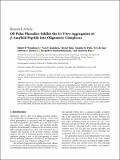| dc.contributor.author | Tan, Yew Ai | |
| dc.contributor.author | Sambanthamurthi, Ravigadevi | |
| dc.contributor.author | Weinberg, Robert P | |
| dc.contributor.author | Koledova, Vera V | |
| dc.contributor.author | Shin, Alice Hyeari | |
| dc.contributor.author | Park, Jennifer | |
| dc.contributor.author | Sinskey, Anthony J | |
| dc.contributor.author | Rha, Chokyun | |
| dc.date.accessioned | 2018-02-12T18:41:12Z | |
| dc.date.available | 2018-02-12T18:41:12Z | |
| dc.date.issued | 2018-01 | |
| dc.date.submitted | 2017-11 | |
| dc.identifier.issn | 2090-8024 | |
| dc.identifier.issn | 2090-0252 | |
| dc.identifier.uri | http://hdl.handle.net/1721.1/113590 | |
| dc.description.abstract | Alzheimer’s disease is a severe neurodegenerative disease characterized by the aggregation of amyloid-β peptide (Aβ) into toxic oligomers which activate microglia and astrocytes causing acute neuroinflammation. Multiple studies show that the soluble oligomers of Aβ42 are neurotoxic and proinflammatory, whereas the monomers and insoluble fibrils are relatively nontoxic. We show that Aβ42 aggregation is inhibited in vitro by oil palm phenolics (OPP), an aqueous extract from the oil palm tree (Elaeis guineensis). The data shows that OPP inhibits stacking of β-pleated sheets, which is essential for oligomerization. We demonstrate the inhibition of Aβ42 aggregation by (1) mass spectrometry; (2) Congo Red dye binding; (3) 2D-IR spectroscopy; (4) dynamic light scattering; (5) transmission electron microscopy; and (6) transgenic yeast rescue assay. In the yeast rescue assay, OPP significantly reduces the cytotoxicity of aggregating neuropeptides in yeast genetically engineered to overexpress these peptides. The data shows that OPP inhibits (1) the aggregation of Aβ into oligomers; (2) stacking of β-pleated sheets; and (3) fibrillar growth and coalescence. These inhibitory effects prevent the formation of neurotoxic oligomers and hold potential as a means to reduce neuroinflammation and neuronal death and thereby may play some role in the prevention or treatment of Alzheimer’s disease. | en_US |
| dc.publisher | Hindawi Publishing Corporation | en_US |
| dc.relation.isversionof | https://doi.org/10.1155/2018/7608038 | en_US |
| dc.rights | Creative Commons Attribution | en_US |
| dc.rights.uri | http://creativecommons.org/licenses/by/4.0/ | en_US |
| dc.source | Hindawi Publishing Corporation | en_US |
| dc.title | Oil Palm Phenolics Inhibit the n Vitro Aggregation of β-Amyloid Peptide into Oligomeric Complexes | en_US |
| dc.type | Article | en_US |
| dc.identifier.citation | Weinberg, Robert P., et al. “Oil Palm Phenolics Inhibit the In Vitro Aggregation of β -Amyloid Peptide into Oligomeric Complexes.” International Journal of Alzheimer’s Disease, vol. 2018, 2018, pp. 1–12. | en_US |
| dc.contributor.department | Massachusetts Institute of Technology. Biomaterials Science and Engineering Laboratory | en_US |
| dc.contributor.department | Massachusetts Institute of Technology. Department of Biology | en_US |
| dc.contributor.mitauthor | Weinberg, Robert P | |
| dc.contributor.mitauthor | Koledova, Vera V | |
| dc.contributor.mitauthor | Shin, Alice Hyeari | |
| dc.contributor.mitauthor | Park, Jennifer | |
| dc.contributor.mitauthor | Sinskey, Anthony J | |
| dc.contributor.mitauthor | Rha, Chokyun | |
| dc.relation.journal | International Journal of Alzheimer's Disease | en_US |
| dc.eprint.version | Final published version | en_US |
| dc.type.uri | http://purl.org/eprint/type/JournalArticle | en_US |
| eprint.status | http://purl.org/eprint/status/PeerReviewed | en_US |
| dc.date.updated | 2018-02-03T07:00:29Z | |
| dc.language.rfc3066 | en | |
| dc.rights.holder | Copyright © 2018 Robert P. Weinberg et al. This is an open access article distributed under the Creative Commons Attribution License, which permits unrestricted use, distribution, and reproduction in any medium, provided the original work is properly cited. | |
| dspace.orderedauthors | Weinberg, Robert P.; Koledova, Vera V.; Shin, Hyeari; Park, Jennifer H.; Tan, Yew Ai; Sinskey, Anthony J.; Sambanthamurthi, Ravigadevi; Rha, ChoKyun | en_US |
| dspace.embargo.terms | N | en_US |
| dc.identifier.orcid | https://orcid.org/0000-0002-1015-1270 | |
| dc.identifier.orcid | https://orcid.org/0000-0002-6671-5987 | |
| mit.license | PUBLISHER_CC | en_US |
